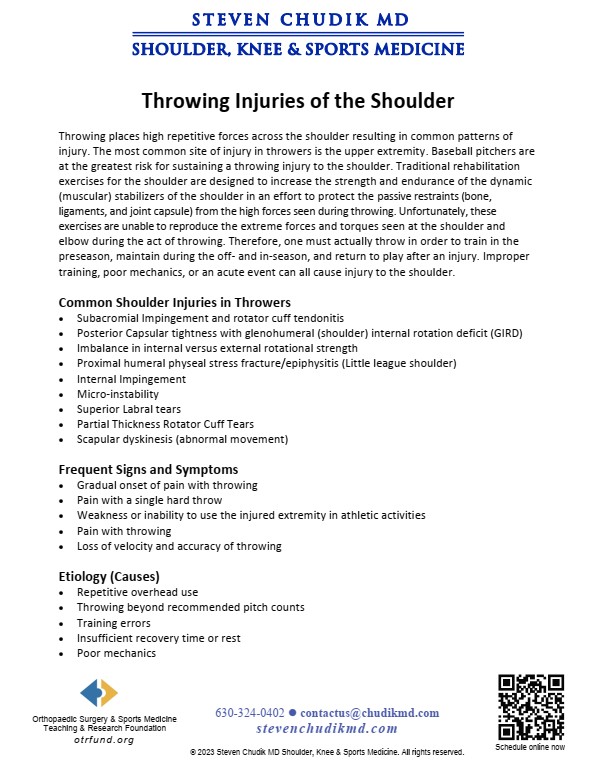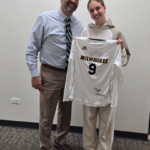Throwing places high repetitive forces across the shoulder resulting in common patterns of injury. The most common site of injury in throwers is the upper extremity, and baseball/softball pitchers are at the greatest risk for sustaining a throwing injury to the shoulder. Traditional rehabilitation exercises for the shoulder are designed to increase the strength and endurance of the dynamic (muscular) stabilizers of the shoulder in an effort to protect the passive restraints (bone, ligaments, and joint capsule) from the high forces seen during throwing. Unfortunately, these exercises are unable to reproduce the extreme forces and torques seen at the shoulder and elbow during the act of throwing. Therefore, one must actually throw in order to train in the preseason, maintain during the off- and in-season, and return to play after an injury. Improper training, poor mechanics, or an acute event can all cause injury to the shoulder.
Whenever a throwing or overhead athlete presents with shoulder pain, they should be rested from throwing until proper diagnosis and treatment is successful in correcting the problem. For most conditions including impingement, rotator cuff tendonitis, posterior capsular tightness, strength imbalances, early internal impingement, and scapular dyskinesis, conservative treatment including physical therapy and correction of throwing mechanics is often successful.
For stress injuries to the growth plate as occurs with Little League Shoulder, three to six weeks, sometimes up to three months, of rest from throwing is required followed by physical therapy and a gradual return to throwing. For structural injury to the labrum or rotator cuff, arthroscopic surgery is often needed to repair the pathology, following by physical therapy. After treatment of all shoulder throwing injuries, a gradual resumption of throwing activities with a strict interval throwing program is required to allow a safe and injury-free return.
Learn More
 Overcoming Her ACL Injury Mentally & Physically: Stronger Than Ever
Overcoming Her ACL Injury Mentally & Physically: Stronger Than Ever
Dr Steven Chudik founded OTRF in 2007 to keep people active and healthy through unbiased education and research. Click to learn about OTRF’s free programs, educational opportunities and ways to participate with the nonprofit foundation.
1010 Executive Ct, Suite 250
Westmont, Illinois 60559
Phone: 630-324-0402
Fax: 630-920-2382
(New Patients)
550 W Ogden Ave
Hinsdale, IL 60521
Phone: 630-323-6116
Fax: 630-920-2382
4700 Gilbert Ave, Suite 51
Western Springs, Illinois 60558
Phone: 630-324-0402
Fax: 630-920-2382

© 2025 © 2019 Copyright Steven Chudik MD, All Rights Reserved.
